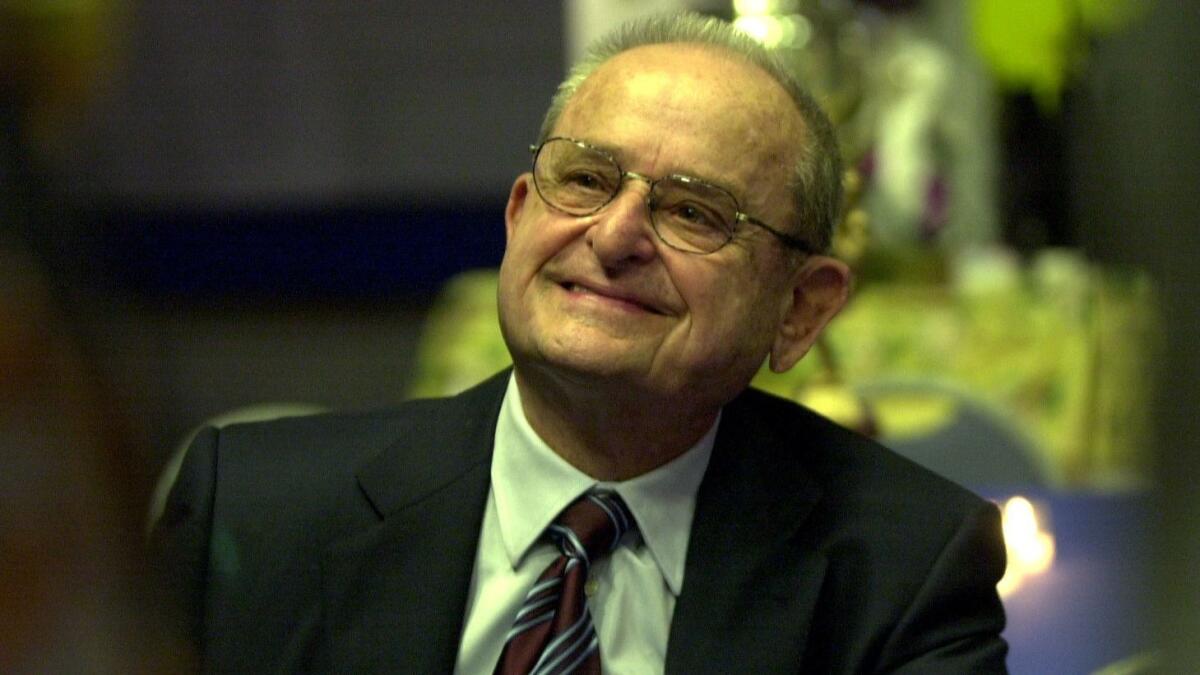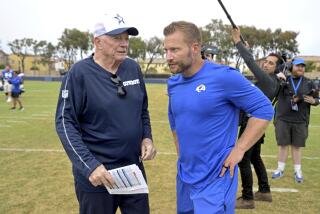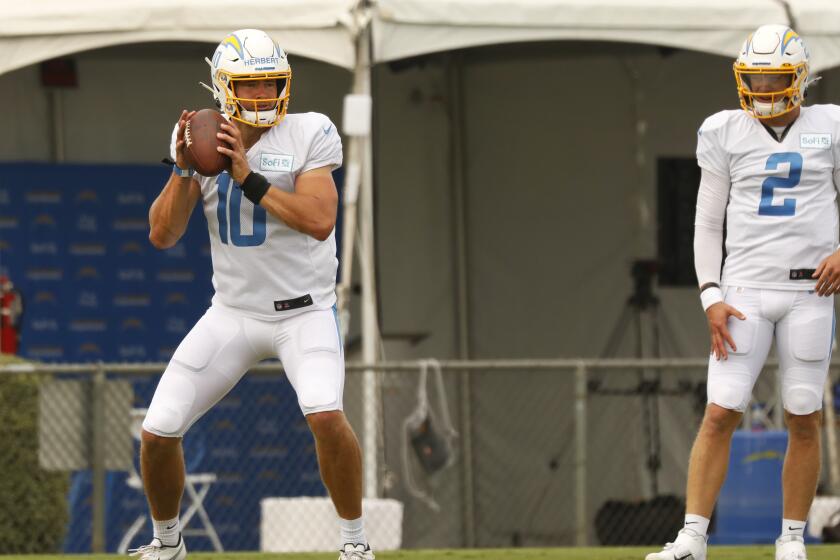Alex Spanos, longtime Chargers owner, dies at 95

Chargers owner Alex Spanos, a plain-spoken, self-made billionaire from Stockton who bought a majority stake in the NFL football club in 1984, died Tuesday morning, the team announced. He was 95.
“We have no words that can adequately express our sadness with his passing,” the Chargers said in a statement. “We will continue to honor his legacy by dedicating ourselves to making a difference in the community and throughout our country.”
The Spanos family has owned the Chargers since Spanos, a construction magnate from Stockton, bought a controlling interest for $48.3 million from Eugene Klein. The club has reached one Super Bowl, following the 1994 season, a game it lost to the favored San Francisco 49ers.
Alex Spanos ceded day-to-day operations of the club to his son Dean in 1994 and was reduced by dementia in recent years. The family, headed by Dean Spanos and his three siblings, chose to move the football club to the Los Angeles area in January 2017 after NFL owners provided it the first option to join the Rams in a privately financed stadium in Inglewood, starting in 2020. The team was valued at $2.275 billion — 22nd in the 32-team NFL — by Forbes last month.
“From humble beginnings to becoming the top apartment builder across the nation and the owner of an NFL franchise, Alex proved that dreams do come true,” the team said in statement.
Alex Spanos’ wife, Faye Spanos, died in August at 92.
Nick Canepa remembers the life of Alex Spanos »
The success of his A.G. Spanos Companies, which built more than 100,000 apartment units in 18 states, enabled Spanos to turn fantasy into reality. He walked with celebrities and political leaders, tap-danced for charity with longtime buddy Bob Hope and contributed millions to charities and Republican causes.
Yet he couldn’t avoid controversy. It began with his shaky stewardship of the Chargers in the 1980s and persisted with issues surrounding the adequacy of the team’s home venue, Qualcomm Stadium, and rumors of the team moving to Los Angeles.
When he bought a majority interest in the Chargers on Aug. 1, 1984, Spanos fulfilled one of his most ardent wishes. But success on the playing field — unlike in his real estate enterprises — ran into a roadblock.
In their first decade under his reign, the Chargers went 72-91, a winning percentage of .442, and only reached the playoffs in 1992.
In October 1993, Spanos persuaded National Football League owners to back San Diego’s bid for the 1998 Super Bowl. After the bid was accepted, the City Council proclaimed Nov. 9, 1993, “Alex G. Spanos Day.”
His tenacity in bringing San Diego a Super Bowl was typical Spanos.
“I’ve always set goals,” he once said. “They were always five-year goals and I’ve been able to achieve every one of them in less than five years.”
First, though, he had to pay his dues.
As a youth, Spanos swept floors, peeled potatoes, baked doughnuts and did other chores seven days a week at his family’s small restaurant and bakery. When his Greek immigrant father refused to pay him more than $40 a week, he borrowed $800 in 1951 and began a catering business, selling bologna sandwiches to migrant farm workers.
Nine years later, he formed A.G. Spanos Construction Co., specializing in apartments. By 2005, he was the chairman of 10 companies and ranked No. 320 on Forbes magazine’s list of the richest 400 Americans with a net worth estimated at $1.1 billion. In July of this year, Forbes valued his net worth at $2.4 billion.
It was a fortune he generously shared.
In 1995, Spanos created the Chargers Community Foundation, which has provided more than $13 million in grants, scholarships and monetary resources to nonprofit organizations throughout Southern California, most of it in San Diego County.
The foundation’s $1.5 million donation kicked off a $6.5 million fundraising effort for the San Diego Hall of Champions Sports Museum, and Spanos’ backing of high school sports led to the the annual Alex Spanos All-Star Football Classic.
His financial support spawned the multi-use Alex G. Spanos Sports Fields in Pacific Beach and the Alex G. Spanos Athletic and Recreation Building at UC San Diego, where the Chargers used to conduct preseason training camp.
Elsewhere in California, he contributed $2.1 million to a track complex at at California State University Sacramento that bears his name and was the site of the 2004 U.S. Olympic Track and Field Trials. His donations to a football stadium and theater at Cal Poly San Luis Obispo led to the renaming of both in his honor. And he contributed $15 million to a state-of-the-art heart center at a Sacramento hospital.
Other examples of his philanthropy:
▪ In 2003, following the worse series of fires in San Diego County history, he donated $2 million to help residents recover from the massive Cedar blaze and other fires.
▪ In 1999, he loaned his jet and two pilots to fly home the body of a 16-year-old girl from Argentina who had been murdered while visiting Yosemite National Park.
▪ In 1997, he gave more than $1 million to help those hit by a series of Sacramento-area floods.
▪ Spanos, always proud of his Greek heritage, underwrote the IMAX film, “Greece: Secrets of the Past,” which opened in 2006 at the Reuben H. Fleet Science Center in Balboa Park.
On the political front, Spanos was considered one of the nation’s leading backers of Republican causes.
He hosted presidents, governors and senators at his Stockton estate or the airport terminal he built that bears his name — the Alex G. Spanos Jet Center at Stockton Airport.
Candidates he supported included President George W. Bush, who sometimes used Spanos’ private jet during his 2004 re-election campaign; Gov. Arnold Schwarzenegger and former Gov. Pete Wilson.
In a statement Tuesday, Wilson said, “Alex was born poor but he was a born winner, a remarkable first-generation American success story — and an outspoken and truly grateful patriot. By word and by his example, Alex insisted that Americans born to freedom earn it and never take it for granted. He embodied the belief that determination and working harder produced winners in business, politics, sports — and whatever else engaged his interest. He was a loving and devoted husband and father, loved his country, loved life and lived it to the fullest. He was a generous philanthropist, and a wonderful, loyal friend — but you didn’t want to sit next to him at a Chargers game if they weren’t winning!
“I will miss him greatly.”
Said Rep. Darrell Issa (R-Vista): “Alex Spanos was a remarkable man. He was also a phenomenal entrepreneur, an extraordinary benefactor of the arts and a civic leader without compare — in two different regions of California no less. Through it all, he was humble and generous. A truly great friend.
“Whether it was turning a few thousand dollars and a mobile sandwich shop into a multibillion-dollar construction business, taking the Chargers to the Super Bowl or learning the soft shoe with Bob Hope on USO trips on behalf of our troops, Alex lived life to the fullest and leaves our world far better than he found it.”
In supporting Bush’s re-election campaign, Spanos gave $5 million to an independent committee that ran television ads attacking Democratic nominee John Kerry.
Bush, in turn, designated Spanos and his wife, Faye, as his representatives at the 2004 Summer Olympics in Athens.
Despite his Republicanism, Spanos was not averse to helping certain Democrats, particularly ones with Greek lineage such as U.S. Sen. Paul Sarbanes of Maryland.
“Alex Spanos has never had an agenda,” his spokeswoman, Natalia Orfanos once said. “What he does, he does because of how he feels.”
Alex Gus Spanos was born Sept. 28, 1923, in Stockton, where in 1998 he moved into a 20,000-square foot home on a nine-acre compound.
It was a far cry from his humble beginning.
From the time he was 8, he baked bread and cakes before school, often rising before dawn. Because of the demands of the family business, there was no time for sports.
In 1941, he left Stockton to study aeronautical engineering at Cal Poly San Luis Obispo, where he became drum major in the marching band. His continued support of the school led to an honorary doctorate of humane letters degree.
During World War II, he joined the Army Air Corps cadet school and became a B-29 gunner.
Spanos returned to Stockton after the war and earned varsity letters in swimming and diving while attending College of the Pacific.
In 1948, he married Faye Papafaklis at the Greek Orthodox Church in Tarpon Springs, Fla.
He was 27, with an infant child, when he made the toughest business decision of his life — to leave the family business.
He borrowed $800 from Bank of America to buy a truck, a slicing machine and other tools to make 250 sandwiches a day for farm workers.
He branched out into recruiting field hands in El Centro and arranged to bring them to Stockton, where he provided the laborers housing. Growers paid him $1.75 per worker per day, providing him with a $1-per-head profit.
“I instituted the strategy that has served me exceedingly well throughout my business career: I played it by ear,” he recalled in “Sharing the Wealth: My Story,” his 2002 autobiography. “I had no choice. I had taken the trip on faith and that faith immediately paid off.”
Five years after he ventured off on his own, Spanos was serving 7,000 meals a day and had earned his first million.
Spanos decided to invest his earnings in real estate. After after buying a few office buildings, motels and raw land, he built his first apartment project, the still-standing Bali Hai in Stockton, in 1960.
“When you build a building, any kind of building, it is a visible embodiment of you, your work and your business ethics,” he wrote.
Spanos built some commercial office buildings, including a new corporate headquarters for his company completed in 2005, and branched out into land development, selling building sites to other builders.
As his business grew to become one of the the largest family-owned construction firms, with 600 employees and eight divisions, Spanos averaged 6,000 miles of travel a week. He would sometimes start his workdays at 5:30 a.m.
Tenacious at whatever he tried, he applied his workaholic resolve to learning golf and, later, a song-and-dance routine with Hope.
Before turning 30, he took up golf. Within five years, he was near a scratch player. In 1960 he represented the United States in the British amateur golf championship.
It was through golf that he met Hope in 1968 in Palm Springs. The pair became close, and Hope was a frequent guest in the owner’s box at Chargers home games.
A self-professed ham, Spanos joined Hope in soft-shoe and tap-dance performances for several years to benefit charities.
“It took me a year and a half to learn to dance,” Spanos told The Tribune in 1984. “I wanted to be perfect. I had a room added on to my office, so I could practice my routine. The critics say I’m good. Damn good.”
The Bob and Dolores Hope Foundation released a statement Tuesday that expressed condolences. “Alex ... and his wife Faye were close friends of Bob and Dolores Hope for decades. A businessman and philanthropist who embodied the American dream, Spanos will be missed by all who knew and loved him. Rest in peace, friend.”
A lifelong sports fan, Spanos tried to buy the San Francisco 49ers in 1977 but was outbid by Edward DeBartolo Jr. In 1983, Spanos bought a 10 percent interest in the Chargers.
Spanos became managing owner of the Chargers in 1984 by beating back a bid to purchase the team by Carl W. Summers Jr., a Dallas real estate developer.
He quickly became known as a hands-on owner whose desire to produce a winner exceeded his patience.
In 1986, he appointed receivers coach Al Saunders as assistant head coach and charged Saunders with acting as a liaison between him and head coach Don Coryell.
Spanos’ act divided the players’ loyalties, according to some sympathetic to Coryell’s position. Coryell, 72-60 with the Chargers, was forced to resign in 1986 and was succeeded by Saunders.
In 1989, Saunders was replaced by Dan Henning, who in 1992 was dismissed in favor of Bobby Ross. In leading front-office roles, meantime, Spanos employed Johnny Sanders, Ron Nay, Steve Ortmayer and, finally, Bobby Beathard.
Spanos’ critics within the football community contended that he tended to act impetuously, that he was an aloof individual, lacking warmth and a sense of humor, consumed by ego, embarrassed by his club’s failures, and uncomfortable among football people.
“I think he’s prudently impatient,” Ortmayer said before Spanos dismissed him in 1990, “and I’ll tell you why. This is a game of impatience, and Mr. Spanos understands that; he understands that if he exercises patience, it will take patience to get it done, and I don’t think he’s willing to give his people a comfort level, and I believe he’s right.
“I don’t think in the world of professional sports, you can operate at a comfort level.”
One critique of Spanos was that while he assigned his football subordinates responsibility, he was loath to deed them authority. But in January 1990 he appointed Beathard general manager and began to exercise a lesser voice in the team’s operations.
Beathard, recognized as one of the NFL’s most astute personnel analysts, had been responsible for the Washington Redskins’ rise to the championship of Super Bowl XXII. In 1992, Beathard brought in Ross from Georgia Tech as the team’s head coach, another move that contributed to the club’s stability.
It was Ross who coached the Chargers to Super Bowl XXIX. Beathard this year was inducted into the Pro Football Hall of Fame.
“He was tough but he was fair,” Beathard said Tuesday from his home in Tennessee. “I got along fine with the Spanoses. The Spanoses were great to us, they really were.”
In 1994, Spanos turned much of the day-to-day operation of the team over to his son, Dean, but remained active in all business matters related to the team and the league.
When Spanos pressured the city to enlarge what was then called Jack Murphy Stadium in 1995 to keep the Chargers from leaving town, the City Council responded by agreeing to issue $60 million in bonds to expand the facility. That amount was increased by $18 million in 1997 when Qualcomm paid that amount to the city for stadium naming rights — good for 20 years.
A lawsuit was filed to stop the expansion, but it failed, and the city continues to spend about $5 million a year to pay off the bonds.
Under pressure to get the stadium ready in time for the 1998 Super Bowl, then-City Manager Jack McGrory authorized crews in December 1996 to start demolishing the stadium for the expansion despite the pending suit.
As part of the expansion, the City Council also endorsed a ticket guarantee that obligated the city to ensure the Chargers receive revenue equivalent to the price of 60,000 general admission seats for every home game from 1997 through preseason 2007.
As the team’s losses mounted, attendance dropped and the city paid the Chargers increasingly more money through the ticket guarantee, angering taxpayers. The guarantee was eliminated in 2004 through lease negotiations between the city and the team, but not before the city had forked over $36.4 million while the ticket guarantee was in force.
In 2000, Spanos expressed the need for a new stadium within five years, raising public dissatisfaction to new heights.
In the following months, team officials made it clear that the stadium expansion did not meet its needs and that a new state-of-the-art stadium with pricey luxury seating was needed to increase revenue so the Chargers could better compete for players with rivals in larger markets.
Even some longtime Chargers fans accused Spanos of being greedy. Some said he was envious of Padres owner John Moores, who had persuaded voters and city officials in 1998 to approve building a ballpark downtown.
By the time the Chargers moved last year, Alex Spanos had been suffering from dementia for about a decade and was no longer involved in the team’s operations.
In a statement Tuesday, NFL Commissioner Roger Goodell said: “Alex Spanos is an American success story, driven by a tireless work ethic inspired by his humble beginnings as the son of Greek immigrants. Alex became one of the country’s most successful businessmen, but he never forgot his roots and the call to help others. Along with Faye, his beloved wife of nearly 70 years, Alex’s philanthropic and civic contributions touched many lives throughout California and around the country. He was a marvelous friend and partner, whose impact on the NFL will never be forgotten. We all benefited from Alex’s compassion, character and zest for football and life. On behalf of the entire NFL family, we extend our deepest condolences to Dean, the entire Spanos family and the Chargers organization.”
Spanos always was an admirer and friend of Al Davis, who ran the Raiders for decades until his death seven years ago.
“The hearts of the Raider Nation are with the Spanos family following the passing of Alex Spanos,” the Raiders said in a statement. “Mr. Spanos is an important part of the National Football League’s history and he leaves a strong legacy with the Chargers and beyond through his generous philanthropic efforts. The Raiders family mourns his loss and our condolences go out to the entire Spanos family.”
Another AFC West rival, the Kansas City Chiefs, also released a statement from Chairman and CEO Clark Hunt: “Alex Spanos was the definition of an American success story. Ingenuity and a relentless work ethic made him an accomplished businessman, and his generosity and commitment to helping others created a lasting legacy. He was a fierce competitor in the AFC West and a dear friend of our family for four decades. Our prayers are with Dean, Susie and the entire Spanos family during this difficult time.”
Spanos’ honors were many, including honorary doctorate degrees from Wayne State University, which he attended during World War II; Cal Poly San Luis Obispo and Hellenic College/Holy Cross Greek Orthodox School of Theology.
Others included the Horatio Alger Award, the Ellis Island Medal of Honor, the Gloria Swanson Humanitarian Award, the Grand Cross Honour by the Supreme Council of Scottish Rite, and the National Distinguished Community Service Award from the Anti-Defamation League of B’nai Brith.
Spanos is survived by his four children, Dean, Dea Spanos Berberian, Alexis Spanos Ruhl and Michael; 15 grandchildren; and 12 great-grandchildren.
Funeral services will be held privately, the team said. In lieu of flowers, donations may be sent in the name of Alex Spanos to the following charities: American Legion – Karl Ross Post #16, 2020 Plymouth Road, Stockton, CA 95204; The Stockton Scholars Endowment Fund at UOP, University of the Pacific, Attn: University Development/Stockton Scholars, Endowed Fund, 3601 Pacific Avenue, Stockton, CA 95211; The Discovery Challenge Academy, 2922 Transworld Drive, Stockton, CA 95206; or YMCA of San Joaquin County, 2105 West March Lane, Suite 1, Stockton, CA 95207
Former Union-Tribune reporters Jerry Magee, John Marelius, Ronald W. Powell, Steve Schmidt and Roger Showley contributed to this report
tom.krasovic@sduniontribune.com;
UPDATES:
11:05 a.m.: This story was updated with comments from former Gov. and Mayor Pete Wilson and NFL Commissioner Roger Goodell.
11:50 a.m.: This story was updated and lengthened with additional information.
12:35 p.m.: This story was updated with additional statements.
More to Read
Go beyond the scoreboard
Get the latest on L.A.'s teams in the daily Sports Report newsletter.
You may occasionally receive promotional content from the Los Angeles Times.








